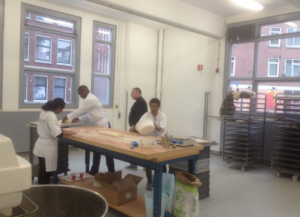 Werkplaats Rotterdam Zuid is a private initiative which works as a facilitator between small and medium enterprise willing to employ people with a disadvantages background. Their project offers facilities for workshops aimed at teaching a job to long term unemployed people, and provided by the enterprises which plans to offer them a job. The payment of the training of these people and their salary are co-financed through Social Impact Bonds, as have been explained by Aad Van Nes, project manager of the WRZ and Rob Dubbeldeman, consultant from Deloitte who works with the WRZ project on its financial sustainability. On the 1st of July, Eurodiaconia organised a study visit to the ‘Werkplaats Rotterdam Zuid’ (WRZ), a joint collaboration by the private and public sector which links those furthest from the labour market to small and medium enterprises in order to provide them with sustainable employment. The diaconal centre of St. Paul’s church in Rotterdam has developed a partnership with WRZ in the framework of providing integrated services to unemployed people.
Werkplaats Rotterdam Zuid is a private initiative which works as a facilitator between small and medium enterprise willing to employ people with a disadvantages background. Their project offers facilities for workshops aimed at teaching a job to long term unemployed people, and provided by the enterprises which plans to offer them a job. The payment of the training of these people and their salary are co-financed through Social Impact Bonds, as have been explained by Aad Van Nes, project manager of the WRZ and Rob Dubbeldeman, consultant from Deloitte who works with the WRZ project on its financial sustainability. On the 1st of July, Eurodiaconia organised a study visit to the ‘Werkplaats Rotterdam Zuid’ (WRZ), a joint collaboration by the private and public sector which links those furthest from the labour market to small and medium enterprises in order to provide them with sustainable employment. The diaconal centre of St. Paul’s church in Rotterdam has developed a partnership with WRZ in the framework of providing integrated services to unemployed people.
The study visit brought together stakeholders operating at different political levels, including representatives from Eurodiaconia’s Dutch member Kerk in Actie, small and medium enterprises, the Municipality of Rotterdam and the Prof. Zdzisław Kraznodębski MEP, rapporteur of the draft report on “How best to harness the job creation potential of small and medium sized enterprises (SMEs)”, participated in the visit and gave an explanatory speech about his draft report, which is going to be discussed in the EMPL committee on the 13 of July. A delegation from the office of Emilian Pavel and Dutch MEP Dennis de Jong took part as well.
To find a report from Deloitte on the Werkplaats Rotterdam Zuid programme, please click here (NL)
To read more information on the Social Investment Bond and on this project, check the dossier Redefining Unemployment Policy here (EN)